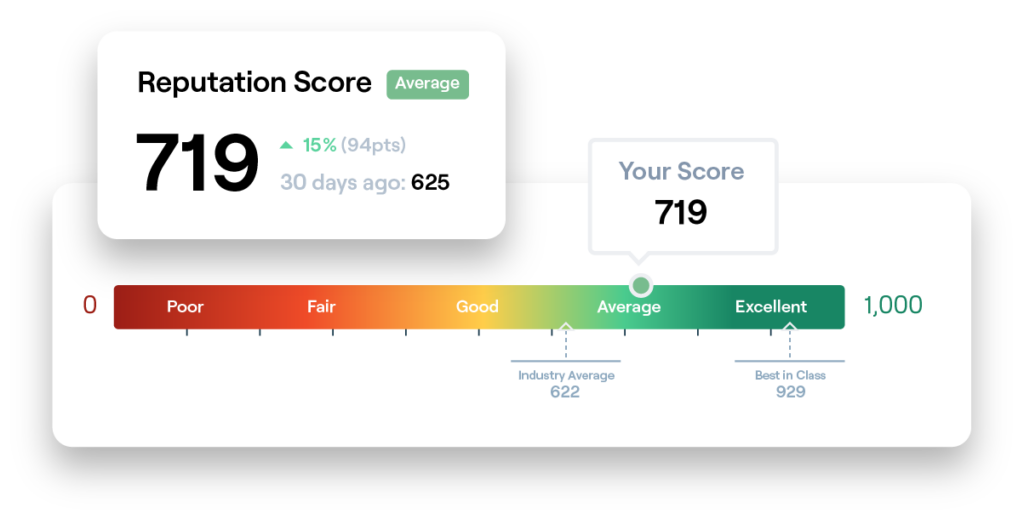Streamlining Success: Key Insights from Reputation’s Roundtable Event
Reputation Staff Writer

At Reputation’s recent invitation-only roundtable event for business leaders, which took place ahead of Transform24 Europe, senior figures and experts from various businesses gathered to discuss how to cut through the noise of multiple metrics, scores, and KPIs to focus on what truly matters. Here are the key insights and narratives from the event, shedding light on the future of reputation performance management.
Simplifying Metrics for Better Focus
In an era where businesses juggle multiple KPIs like Google scores, Auto Trader scores, and brand health metrics, it’s easy to get overwhelmed. Our roundtable discussion highlighted the importance of the Reputation Score, a comprehensive metric simplifying this complexity. Some delegates emphasised how transitioning from a well-known Google Score to the more granular Reputation Score helped their organisations achieve alignment across all departments.
BoConcept’s experience illustrates this perfectly. By focusing on the Reputation Score, they benchmark performance across diverse locations—from their flagship store in London to smaller village outlets—ensuring consistent customer experience and actionable insights.

Recommended resource: Reputation Score: A Better Approach to Data-Driven Marketing
Breaking Down Silos Between Marketing, CX, and Operations
One significant challenge discussed was integrating non-customer-facing teams into the customer experience (CX) strategy. Thomas Ryan, Customer Engagement Specialist at Young’s, shared how his organisation successfully rolled out the Reputation Score, ensuring every department, including Finance, spoke the same language. This cross-functional alignment has been pivotal in driving company-wide focus and improving customer outcomes.
Amanda Mason, Head of Marketing at Roadchef, highlighted how their CX team bridges the gap between marketing and operations, leveraging data from our platform. This integration has fostered collaboration, allowing operational leaders to engage deeply with customer feedback and drive improvements.
Recommended resource: How Our Top Performers Use Customer Insights To Break Down Marketing and CX Silos
Incentivising Teams Through Gamification
While gamification and incentivising teams through key metrics can motivate teams, it has its pitfalls. It can ensure focus on the customer but drive the wrong behaviours as customer-facing teams become fixated on incentives.
For example, Amy Walters from St Austell Brewery pointed out that without proper oversight, there’s a risk of manipulating scores. The key is fostering a culture of transparency and ethical behaviour. Our platform supports this by providing real-time, transparent insights, ensuring that the focus remains on genuine improvements rather than gaming the system.
By encouraging honest feedback and rewarding transparency, businesses can maintain integrity in their reputation management practices. This approach not only builds trust but also drives long-term success.
Recommended Resource: Why You Need to Administer Employee Surveys
Future-Proofing with AI
AI is revolutionising reputation performance management. At the roundtable, we explored how AI-driven text and sentiment analysis can provide deeper insights into customer feedback. This technology allows businesses to catch issues in real time, preventing negative feedback from escalating.
By leveraging AI cautiously, companies can perform customer recovery live, addressing concerns before they turn into complaints provided they ensure careful checking by human personnel. This proactive approach not only enhances customer satisfaction but also strengthens brand loyalty.
Recommended resource: Reputation Appoints New CTO To Spearhead AI Product Innovation
Balancing Competitive Intelligence with Actionable Insights
Competitive Intelligence (CI) was another hot topic. While high-level CI metrics are valuable for board presentations, actionable insights at the local level are crucial for operational teams. A leading UK pub brand shared how they identified key revenue-impacting categories and benchmarked themselves against main competitors to drive tangible improvements.
Although some companies found traditional CI tools lacking in actionable insights, the consensus was clear: localised competitive intelligence, when combined with the Reputation Score, provides a powerful tool for strategic decision-making.
Recommended resource: Leverage Competitive Intelligence to Stand Out in an Increasingly Competitive Landscape
Conclusion: Looking Ahead
The insights from our roundtable event underscore the importance of a unified approach to reputation performance management. By focusing on a comprehensive Reputation Score, integrating cross-functional teams, leveraging AI, and maintaining a culture of transparency, businesses can achieve sustainable success. At Reputation, we are committed to driving innovation and supporting our customers every step of the way.
For more insights and to see how Reputation can transform your business, get in touch with us today.










